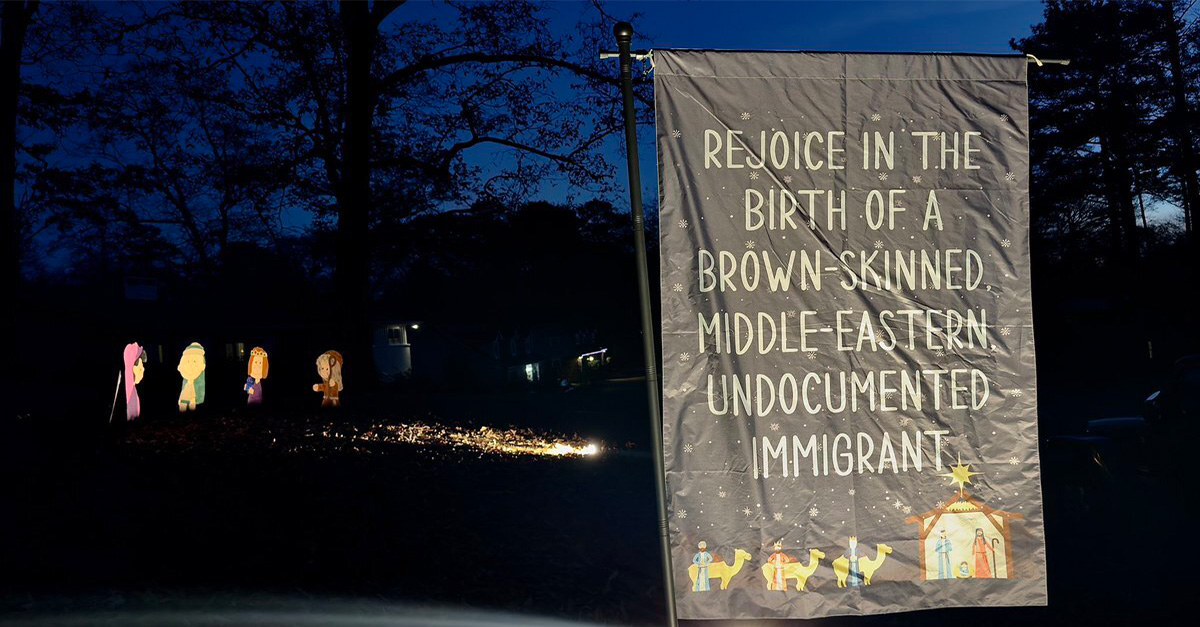


Get a free copy of Parental Rights & Education when you subscribe to our newsletter!

Nowhere in the laundry list of intersectional talking points casting Jesus as an “undocumented immigrant,” “refugee,” and “Palestinian” can what truly matters about His identity be found: That Jesus Christ is God the Son incarnate, come to save His people from their sins.
It’s almost impossible to keep up with the ever-changing liberal reinterpretation of the birth of Christ and, even worse, the squabbles over the nature and meaning of his “ethnicity.” For years, we’ve heard that “Jesus was a refugee” as if that somehow means America shouldn’t secure its border and prioritize its citizens over the global population (and He wasn’t a refugee, in the modern sense anyway).
Who is this Jesus that Young claims to follow? His sign makes it clear — a Jesus that is nothing more than a political mascot and the figment of a neo-Marxist infected imagination. The yard sign read: “Rejoice in the birth of a brown-skinned, Middle-Eastern, undocumented immigrant.”
Is that why we “rejoice” at the birth of Christ? Not according to the Bible. Luke 2:10-11 tells us exactly what the cause for “great joy” is at Christmas — the birth of a Savior: “But the angel said to them, ‘Do not be afraid. I bring you good news that will cause great joy for all the people. Today in the town of David a Savior has been born to you; he is the Messiah, the Lord.’”
Then, on December 25, the liberal Catholic priest Edward Beck went even further. On CNN, he tried to claim:
“I think the message of Christmas is that God enters into it with us and we’re not alone in it. What I’m so struck by is that the story of Christmas is about a Palestinian Jew — how often do you find those words put together? A Palestinian Jew born into a time when his country was occupied, right? They can’t find a place for her to even give birth, his mother. They’re homeless. They eventually have to flee as refugees into Egypt, no less. I mean, you can’t make up the parallels to our current world situation right now.”
So now, according to liberal dogma, what’s really important about Jesus is that He is a “brown-skinned, Middle-Eastern, undocumented immigrant” who was also a “Palestinian Jew” born into “occupied” territory” to a “homeless” couple who had to “flee as refugees.”
But nowhere in that laundry list of identity politics-based talking points can what truly matters about the identity of Jesus Christ be found: That He is the second member of the Trinity, God the Son incarnate, the Word made flesh, the long-awaited and promised Messiah, come to save His people from their sins.
This audacious narrative and DEI-driven propaganda crumbles under scrutiny when examined through the lens of historical accuracy and, more crucially, the theological context of Christ’s own declarations. From a historically orthodox Christian perspective, it is evident that the attempt to fit Jesus into modern political paradigms is not only misguided but also a selective appropriation of His identity.
The claims by Young and Beck are theologically subversive and historically inaccurate. First, the claim that Jesus was born as a “Palestinian Jew” is anachronistic and wrong. Yes, Jesus was born a Jew, but Matthew 2:1 teaches us that “Jesus was born in Bethlehem in Judea.” Furthermore, what we understand to be Palestine today did not exist when Christ was born. As conservative political commentator Erick Erickson noted, “Palestine was not even a creation of the Roman Empire at the time of Christ’s birth. Pushing a political agenda like this, using Christ, reflects poorly on the network.”
Second, the assertion that Jesus and his earthly parents, Joseph and Mary, were undocumented immigrants fundamentally distorts the historical geopolitical realities at the time of His birth. The biblical account in the Gospel of Luke describes Joseph and Mary traveling to Bethlehem for a census, a common practice in the Roman world. Far from being unauthorized “migrants,” they were dutifully adhering to the law of the land.
Luke 2:1 tells us that “In those days a decree went out from Caesar Augustus that all the world should be registered.” It would be entirely inaccurate to reinterpret their travel for “registration” to mean that, prior to the census, they were “undocumented.” This fact directly contradicts the narrative that seeks to portray Jesus as a symbol of open borders and unrestricted immigration. The Bible does not support the idea that Joseph and Mary violated any “immigration laws” as they traveled to Bethlehem. Rather, it presents a scenario where a family followed the legal requirements of the time, discrediting attempts to co-opt this historical event for contemporary political agendas.
Jesus wasn’t “born in Palestine” and He wasn’t an “undocumented immigrant” — He was born to Jewish parents traveling to a town in Judea, a place of ancestral heritage and significance, for the very purpose of being documented — and, of course, to fulfill the prophecy in Micah 5:2, “But as for you, Bethlehem Ephrathah, Too little to be among the clans of Judah, From you One will come forth for Me to be ruler in Israel. His times of coming forth are from long ago, From the days of eternity.”
While progressives are eager to reinterpret historical events, they appear just as intent on neglecting the foundational theological truths about Jesus Christ. The Left’s insistence on re-casting Jesus to fit their agenda undermines the true essence of Christ’s identity. The theological foundation of Christianity is rooted in the belief that Jesus is not merely a historical figure but the eternal Son of God, the Lord of all.
The political appropriation of Jesus conveniently overlooks this central tenet of true Christian theology — the divinity of Christ. The New Testament is replete with explicit statements from Jesus about His identity as God incarnate. In John 10:30, Jesus declares, “I and the Father are one.” And in John 8:58 Jesus states, “Before Abraham was, I am.”
Such declarations of divinity are consistent throughout the Gospels. Unfortunately, they are nowhere to be found on CNN.
Yet, the same voices that advocate for a politically redefined Jesus seem hesitant to embrace His unequivocal statements about being the Lord, and if He is Lord (which He is) they must submit their entire lives to Him in obedience, including their political beliefs. Erickson also perceptively observed that “So many of the people who will say Jesus was from Palestine will not say Jesus is God. They use Him as a political prop but will not worship Him.”
This selective theology not only undermines the integrity of the Christian faith but also reveals a disconcerting willingness to manipulate religious figures to advance secular ideologies.
The attempt to cast Jesus as an undocumented immigrant and a refugee undermines, and even destroys, the profound spiritual and theological implications of His life and message. Using Jesus like this diminishes His rightful place as the central figure and founder of Christianity, the one true religion. The significance of the birth of Christ, His teachings, and His divinity cannot be reduced to an intersectionality box-checking paradigm without losing the very truth of the Gospel itself.
The Bible, again, serves as our guide here. Isaiah 9:6, KJV, teaches us what is most important about the identity of Christ: “For unto us a child is born, unto us a son is given: and the government shall be upon his shoulder: and his name shall be called Wonderful, Counsellor, The Mighty God, The Everlasting Father, Prince of Peace.”
If you can call Jesus a “refugee” but you can’t call Him “The Mighty God” then whatever you are advancing isn’t Christianity, it’s something else entirely. It is, in essence, another religion.
In conclusion, the attempt to cast Jesus as an “undocumented immigrant,” “refugee,” or a “Palestinian” not only distorts historical facts but also reveals a deeper issue — the desire to manipulate religious figures for anti-Christian and anti-American political ends. As Daniel Suhr explained, the agenda behind this propaganda is clear: “If you take your Christian faith seriously, then you need to support the Democrats on immigration, the border, the wall, amnesty, Dreamers, etc.”
These progressive efforts compromise the theological integrity of Christianity and mock the Lord by reducing Jesus to a mere pawn in the chessboard of contemporary political debates. It is an act of taking the name of the Lord in vain, a violation of the Third Commandment.
Rather than selectively appropriating aspects of Christ’s life to fit into modern paradigms, Christians are called to engage with the fullness of His teachings, which include repentance and faith, believing that the Bible is the Word of God, and submitting to Christ as Lord of all. This is, sadly, exactly what liberals refuse to do because that would require taking off the crown they have placed on their own heads and bending their knees to the one true King.
If you like this article and other content that helps you apply a biblical worldview to today’s politics and culture, consider making a donation here.

Notifications